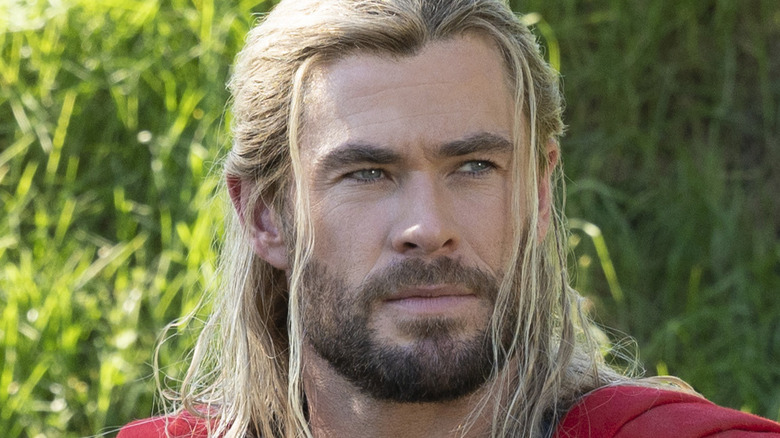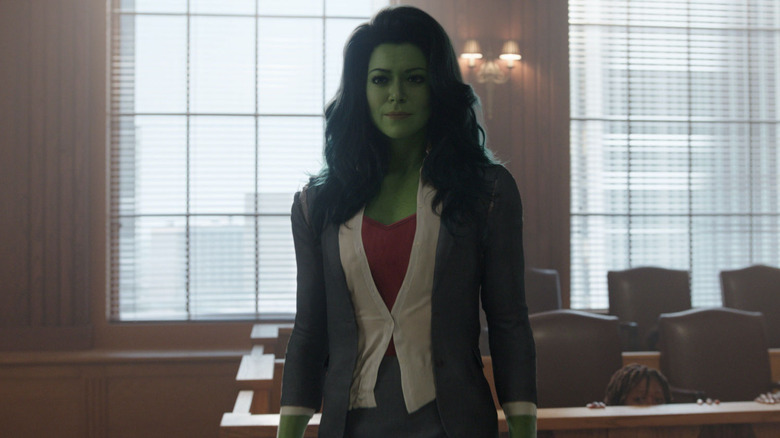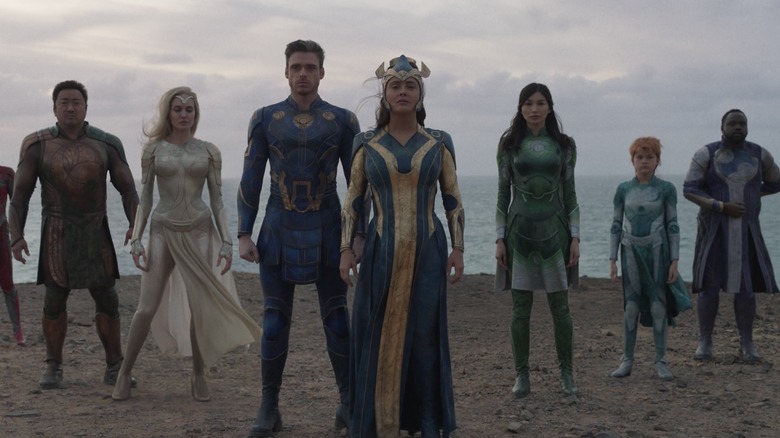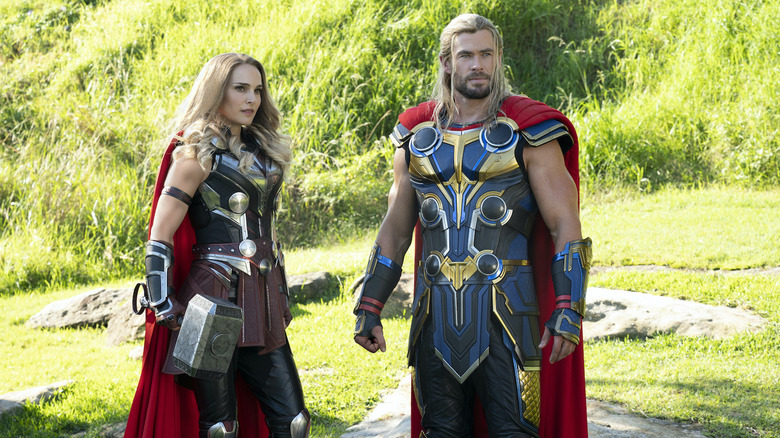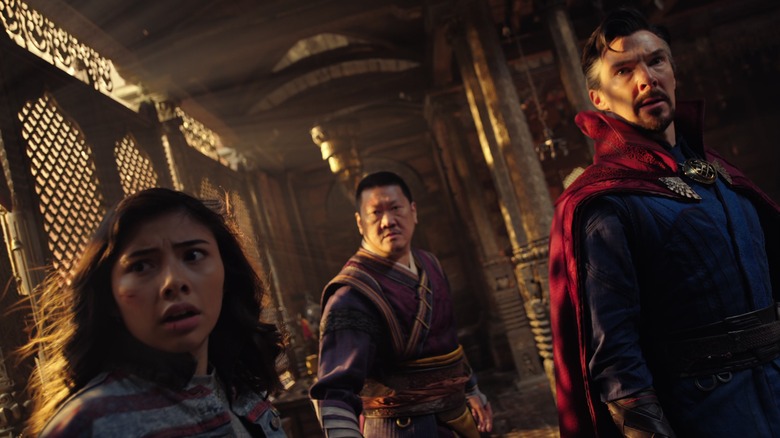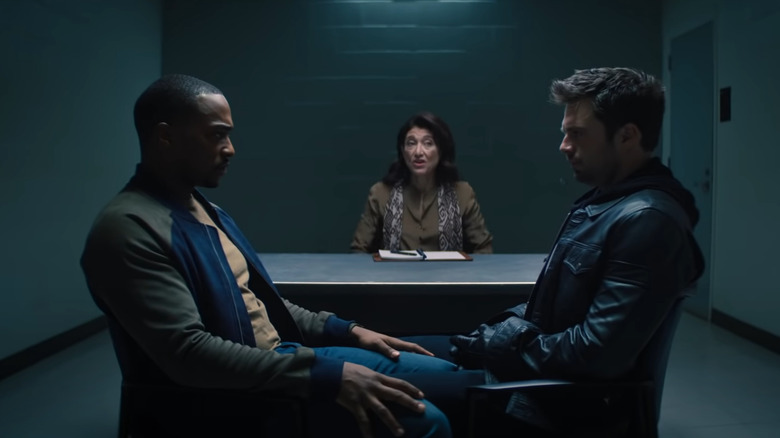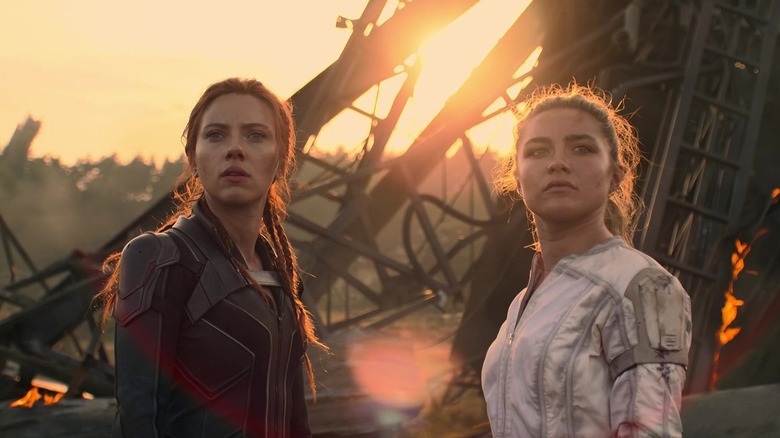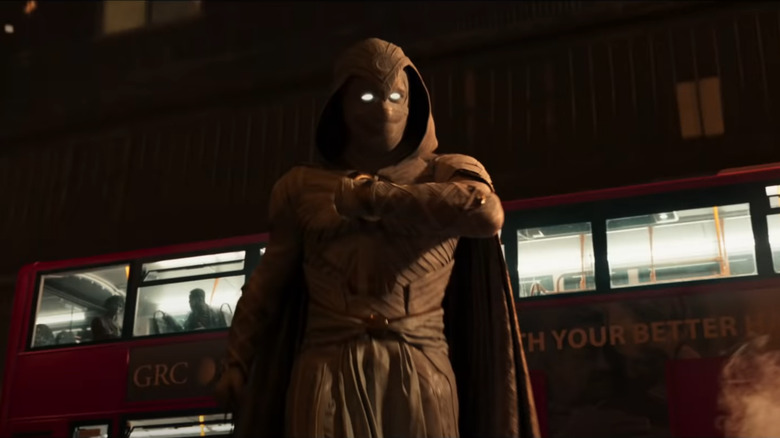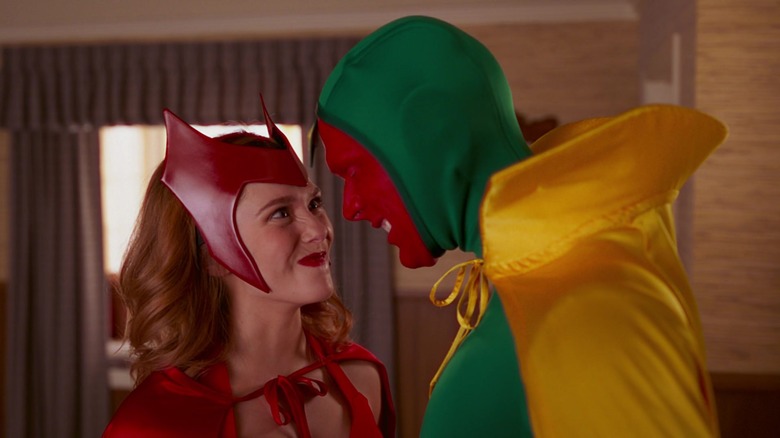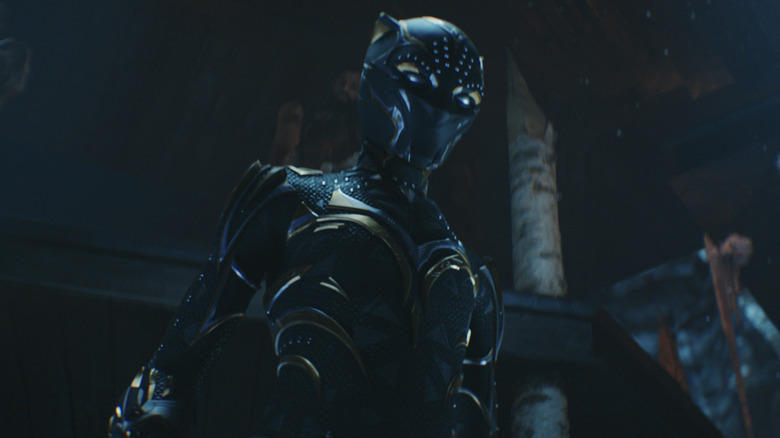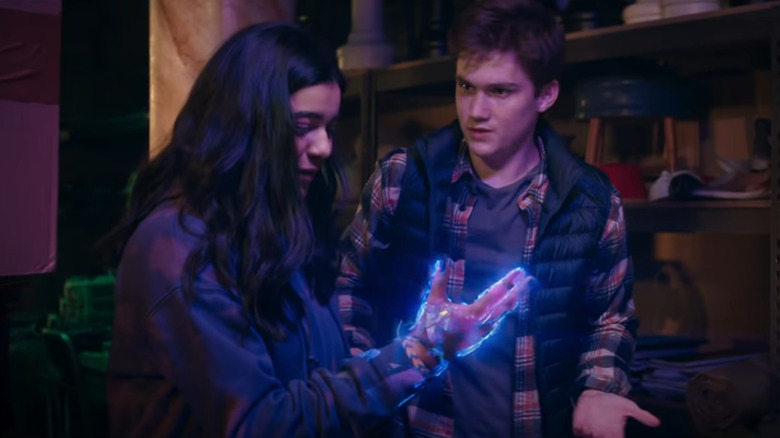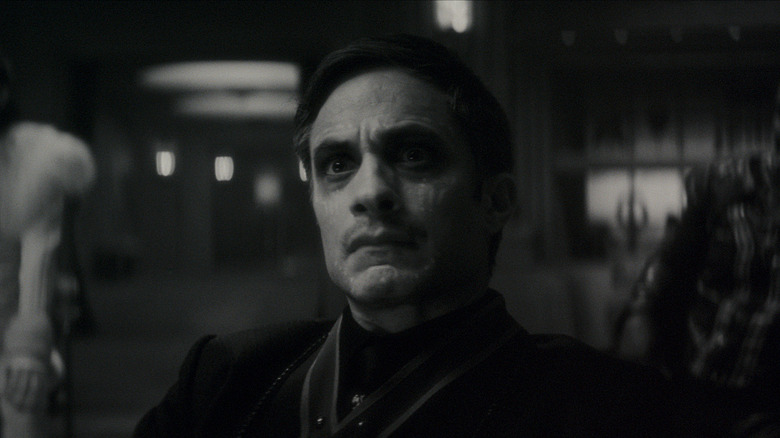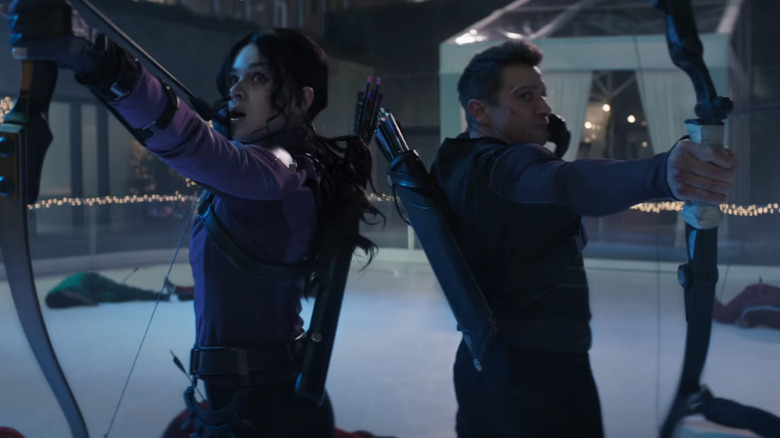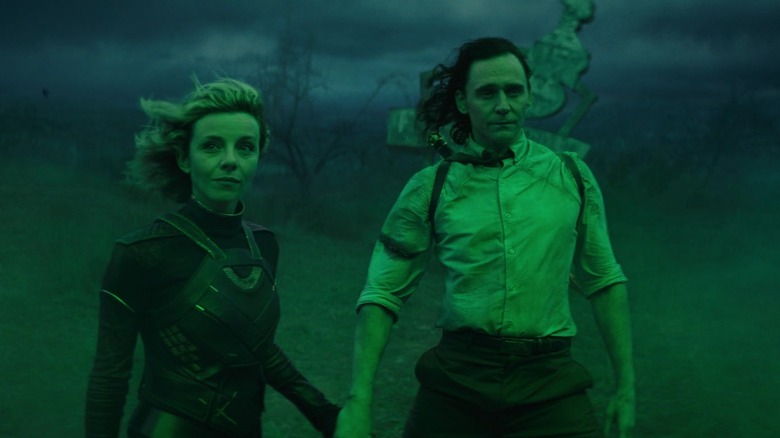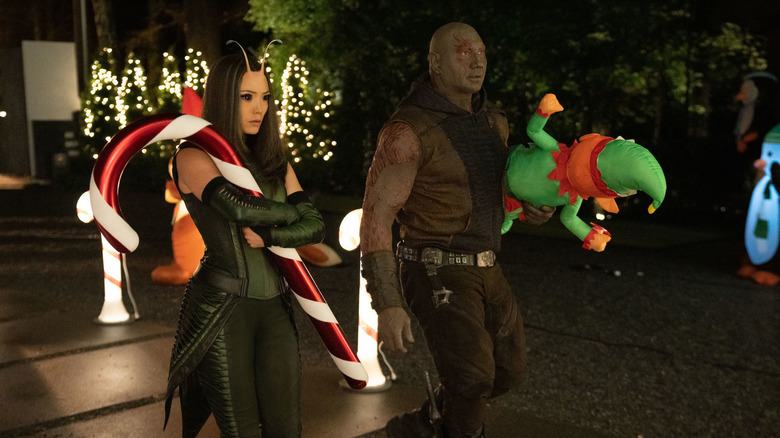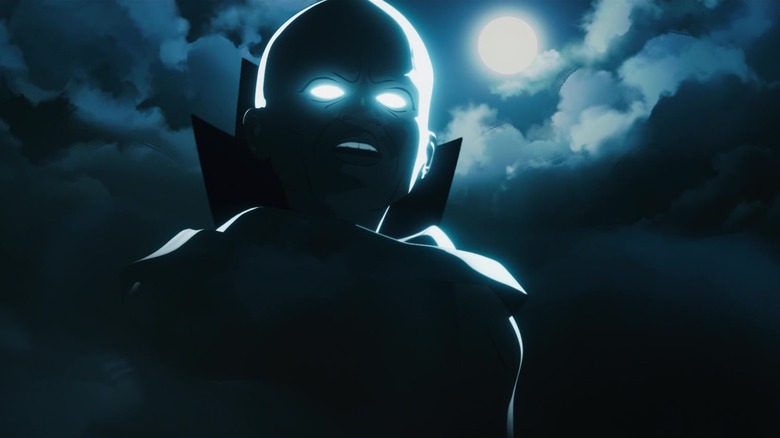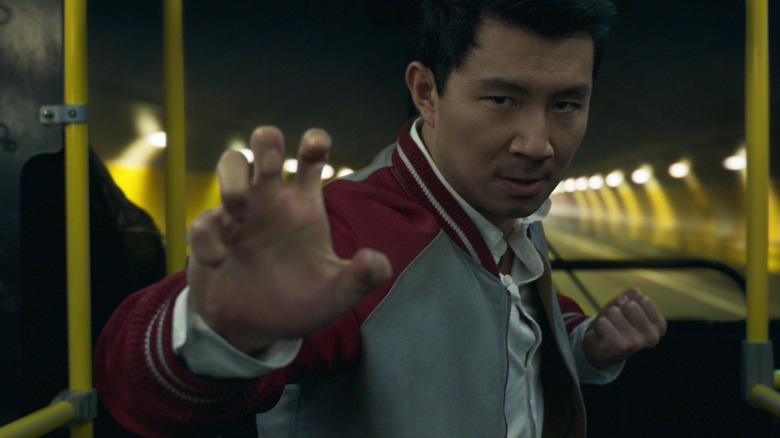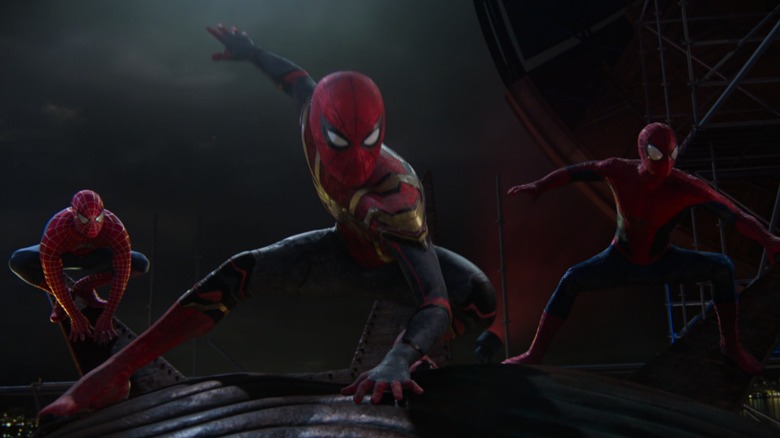Every Marvel Phase 4 Release Ranked Worst To Best
After a pandemic-induced hiatus following the end of Phase 3, the Marvel Cinematic Universe came back strong for Phase 4. Not only is this the first phase to include TV shows alongside the usual steady stream of movies, but it's also the first phase following the conclusion of the Infinity Saga. That means new characters who can take the franchise in fresh directions, a deeper dive into what drives several established characters, and a particular emphasis on the multiverse.
All of this makes it a very good time to be an MCU fan. However, not all of the MCU's Phase 4 releases are equally beloved. We've ranked every Phase 4 film and TV show that's been released so far, using the average of Rotten Tomatoes' critics and audience scores. With a whopping 17 TV shows and movies, Phase 4 is an ambitiously sprawling beast, branching out from the fight against Thanos (Josh Brolin) that drove it for over a decade. In the process, it has taken a lot of big swings, some that critics and audiences embraced and others that were met with more skepticism. Here are all of the Marvel Phase 4 entries, ranked from worst to best.
17. She-Hulk: Attorney at Law
The MCU's first half-hour sitcom, "She-Hulk: Attorney at Law" is, as main character Jennifer Walters (Tatiana Maslany) repeatedly insists, a lawyer show — except when a rampaging antagonist forces Jen to use her Hulk powers to smash. The show recounts She-Hulk's origin story, including why she's better able to control her transformation into a lean, green fighting machine than the Hulk (Mark Ruffalo), and how she reluctantly becomes a part-time superhero. Plus, Jen's new She-Hulk status opens the door for all kinds of MCU cameos, and nearly every episode includes at least one big-name guest star, from Ruffalo's Hulk and Tim Roth's Abomination to Benedict Wong's Wong and Charlie Cox's Daredevil.
All of this proves to be a lot of laugh-out-loud fun, but it also makes for a wildly uneven nine episodes, where the show's penchant for meta-comedy and mocking MCU tropes often come at the expense of the story (per AV Club). Still, critics and audiences were polarized over whether that was a positive or negative. On the one hand, critics mostly praised the series, appreciating what made it funny and enjoyable over its flaws. On the other hand, "She-Hulk" was the Phase 4 release audiences were most unhappy with. Although, based on the number of complaints with how "woke" the show is, part of that appears to be the result of a substantial amount of review bombing. Some audience members also disapproved of the show's weak plotting, criticized the CGI of the main character, and found the comedy more cringey than chuckle-worthy.
16. Eternals
Out of all the films in the franchise, "Eternals" feels the least like an MCU film, which could be seen as both a positive and a negative. The story of a group of 10 immortal superpowered aliens who came to Earth millennia ago to protect the population against the destructive Deviants, the sprawling dysfunctional family reunites after a Deviant inexplicably pops up in modern-day London. Determined to protect humanity once again, they re-enter the fray, but there's more behind the return of the Deviants than initially meets the eye, leading to shocking revelations that eventually place members of the long-lived group on opposite sides of an apocalyptic conflict.
With so many new characters and a story spanning thousands of years, "Eternals" was always going to be a strange fit with the larger MCU. The movie is undeniably ambitious, and Oscar-winning director Chloé Zhao ensures it features stunning visuals, absorbing exposition, and a calmer, quieter tone than many of its more frantic counterparts. But critics complained the film is also overly long and burdened with uninspired action sequences, unoriginal plot points, and a chemistry-free central romance between Gemma Chan's Sersi and Richard Madden's Ikaris. "Eternals" introduces some intriguing new elements into the MCU, but on balance, it never manages to capture the imagination or get under the skin like many other movies in the franchise.
15. Thor: Love and Thunder
Marvel's "Thor: Love and Thunder" is a fun and buoyant addition to a franchise that has started to feel a little weighed down by its attempts to forge new directions in the wake of the Infinity Saga. Yet many critics have complained that "Love and Thunder" feels like a less innovative redo of 2017's "Thor: Ragnarok," making for a film that's locked too much in its own past.
The movie's story picks up with Thor (Chris Hemsworth) still traveling the universe with the Guardians of the Galaxy following the events of "Avengers: Endgame." Thor has shed the pounds he put on after the Avengers lost to Thanos in "Avengers: Infinity War" and has helped the Guardians save countless alien races, but he's still isolated and alone. Things start to change when he returns to New Asgard to discover his ex-girlfriend Jane Foster (Natalie Portman) fighting as the Mighty Thor against a new threat, Gorr the God Butcher (Christian Bale), who's intent on eradicating the gods.
The former couple team up to take out Gorr, and along with Valkyrie (Tessa Thompson) and Korg (Taika Waititi), travel from the brightness of Omnipotence City, the embassy of the gods, to the color-drained world of the Shadow Realm where Gorr resides. It's a vibrant journey accompanied by plenty of humor, heart, and even a touch of horror, all set to a rollicking metal soundtrack. Yet while "Love and Thunder" offers plenty for long-time MCU fans to love, for some, the story may feel a little redundant or disjointed (per Bleeding Cool), while for others it may even seem like a step back for Thor, a character who's been through a lot but doesn't seem to have grown all that much.
14. Doctor Strange in the Multiverse of Madness
There was plenty of excitement when it was announced that Sam Raimi, the director of the original "Spider-Man" trilogy, would helm the second movie in the "Doctor Strange" series. Fans were eager to see how a veteran like Raimi would handle an MCU film, but perhaps the most interesting thing about Raimi's approach to "Doctor Strange in the Multiverse of Madness" is that his stamp can be seen less in the superhero moments and more in the film's numerous horror beats, which often recall Raimi's "Evil Dead" movies. Moreover, while this is a "Doctor Strange" movie, it's as much about Elizabeth Olsen's grieving Wanda Maximoff as it is the one-time Sorcerer Supreme (Benedict Cumberbatch).
The story gets going when Strange and his longtime ally Wong (Benedict Wong) save America Chavez (Xochitl Gomez), a girl with the ability to hop across the multiverse. She's being pursued by Wanda, who's gone full Scarlet Witch, so Strange makes it his duty to protect her. This leads to a chase across worlds, which enables the movie to bake in plenty of fan service, providing some extra zings of excitement for longtime Marvel enthusiasts.
"Doctor Strange in the Multiverse of Madness" is a distinctly dark entry in the MCU, which makes it stand out from the more optimistic tone of many of the previous movies. However, fans' and critics' mileage will vary depending on how much they buy into the new directions the story takes some of the characters and how much they enjoy the movie's horror elements.
13. The Falcon and the Winter Soldier
When Chris Evans' Captain America exited the MCU at the end of "Avengers: Endgame," he left a void at the center of the franchise that fans knew would have to be filled. The six-part Disney+ series "The Falcon and the Winter Soldier" was created to illustrate exactly how that happens. Even though Cap bequeathed his shield to Anthony Mackie's Falcon/Sam Wilson, instead of picking up his friend's mantle, Sam decides to donate it to the U.S. government. Cap's other potential successor, best friend and former Winter Soldier Bucky Barnes (Sebastian Stan), is against the idea, and Bucky's proven correct when, against Sam's wishes, the government gives the shield and the title of Captain America to John Walker (Wyatt Russell).
Despite their frustration with this development, Sam and Bucky end up having bigger fish to fry when they go up against the Flag Smashers, an anti-nationalist group that counts supersoldiers amongst its members. This leads to a globe-trotting adventure in which the pair enter into an unlikely alliance with Helmut Zemo (Daniel Brühl), re-team with former SHIELD Agent Sharon Carter (Emily VanCamp), and ultimately go up against the new Captain America, before Sam finally decides to take over the role.
Although the series starts slow, once it takes off, critics found it packs in plenty of heart-pumping action, timely political and social commentary, and best of all, more time with Sam and Bucky as they learn to work together without Cap there to bring them together. The show is definitely "overstuffed [and] often unfocused" (per The Ringer), but it's still rewarding to get more insight into these two formerly secondary characters.
12. Black Widow
After a lengthy delay due to the pandemic, "Black Widow" was the first movie to finally be released as part of Phase 4. It's intended to finally shed light on the backstory of Natasha Romanoff (Scarlett Johansson), a character who entered the MCU back in 2010 with "Iron Man 2." Yet because it's a movie about a character who died (spoilers, but come on) in "Avengers: Endgame" and takes place between the Phase 3 films "Captain America: Civil War" and "Avengers: Infinity War," the movie feels like more of an afterthought than it might have had it been made and released earlier in the franchise.
Still, Natasha finally gets the solo movie she always deserved, and her story leads to the introduction of several exciting new characters. The action begins when a strange encounter with a masked opponent leads Natasha to seek out Yelena Belova (Florence Pugh), her one-time "sister" who, like Natasha, was trained as a Russian assassin by the Soviet training program the Red Room. Natasha and Yelena team up, and soon they've reunited with the people that acted as their father and mother figures when they were children: Alexei (David Harbour), the superpowered Red Guardian, and Melina (Rachel Weisz), a brilliant scientist and spy who was also trained by the Red Room.
Their family dynamic is the best thing about the film (per Black Girl Nerds). Critics found the film funny, touching, and relatable. Some critics noted it cast Natasha in the spotlight she deserved, placing her in a pleasantly standalone adventure unlike anything we've seen her in before (per the Toronto Sun). Plus, Alexei, Melina, and especially Yelena are fun and original additions to the MCU. Unfortunately, the film's rote action and underwhelming villains, critics noted (such as ReelViews), pull much of the focus, making for an entertaining but uneven swan song for one of the original Avengers.
11. Moon Knight
By the time "Moon Knight" was released, magic was an established part of the MCU, but it'd never been used quite like it is in this series. The tale of Marc Spector (Oscar Isaac), a mercenary who's also the avatar for the Egyptian god Khonshu (F. Murray Abraham), Marc's life would be complicated enough if doing the cranky deity's bidding was the only thing he had to worry about. However, Marc also has Dissociative Identity Disorder, and when one of his alters, Steven Grant (Isaac again), discovers what he's been up to, things get even dicier.
"Moon Knight," with its deep dive into Egyptian mythology, superhero antics, and multiple main characters sharing one body, is a decidedly unusual MCU outing. However, it's also intriguing and even poignant, as Marc and Steven work together to stop cult leader Arthur Harrow (Ethan Hawke) from bringing a deadly Egyptian goddess to Earth, learning along the way how much they've come to rely on one another.
The show's mythology-driven plot gets awfully technical at times, and that combined with some ho-hum action sequences can lead to lulls in the story. Overall, though, critics praised "Moon Knight" for being absorbing and entertaining, especially as it dives deeper into Marc's backstory, and it's all anchored by an impressive dual performance by Isaac.
10. WandaVision
"WandaVision" kicked off Phase 4 of the MCU in early 2021 and was also the very first MCU TV show on Disney+. That's a lot of pressure for a new series, but "WandaVision" more than rose to the occasion, with critics praising how smart, creative, and compelling the MCU could be in an episodic TV format.
The series begins as Wanda Maximoff aka Scarlet Witch and Vision (Paul Bettany) move to the small suburban town of Westview, New Jersey, mere months after the events of "Avengers: Endgame." That wouldn't be so eyebrow-raising if it weren't for the fact that Vision died in "Avengers: Infinity War" and each episode of the show perfectly mimics a different era of television. As the episodes go on and more light is shed on the mystery of what's really happening in Westview, "WandaVision" deepens from an impeccably realized homage to TV sitcoms of the past to a poignant and heartbreaking meditation on loss and grief.
"WandaVision" proved that TV was a worthwhile avenue for exploring MCU characters whose screen-time in the franchise's movies was limited, and via Kathryn Hahn's Agatha Harkness, showed that the format was also capable of introducing new fan-favorite characters (per GamesRadar+). The show wouldn't have worked, however, without Olsen and Bettany, who give alternately hilarious, moving, and devastating, Emmy-nominated performances (per NPR).
9. Black Panther: Wakanda Forever
A follow-up to 2018's lauded "Black Panther," "Black Panther: Wakanda Forever" had to walk a difficult tightrope after its lead actor Chadwick Boseman, who played T'Challa and his superhero alter-ego in multiple Phase 3 films, died before he could reprise his role in the sequel. Thankfully, the movie rises to the occasion. By having T'Challa's fate mirror Boseman's, director Ryan Coogler and his co-writer Joe Robert Cole honor the actor, while offering an avenue for fans to mourn both Boseman and his character. This ensures that the movie is powerful and poignant, and also serves as a catalyst to further the stories of beloved Wakandans like Shuri (Letitia Wright), Okoye (Danai Gurira), and Nakia (Lupita Nyong'o), as each on of them move into the future.
The film also includes a bevy of new and exciting characters, including antagonist Namor (Tenoch Huerta Mejia), leader of the underwater empire of Talokan, and Riri Williams (Dominique Thorne), who's poised to become Ironheart, the heir apparent to Iron Man. While this leads to an often overstuffed story (per the New York Times), in general, critics and audiences agreed that "Wakanda Forever" is a compelling, emotionally satisfying installment in the franchise that does right by the fallen T'Challa.
8. Ms. Marvel
The first Muslim superhero in the MCU, "Ms. Marvel" focuses on Pakistani-American teenager Kamala Khan (Iman Vellani), who is granted superpowers by a bangle whose roots in her family history go back generations. For many critics, "Ms. Marvel" stands out for how breezy and bright it feels. Before Kamala develops her own powers, she's a huge Marvel fan, especially of Captain Marvel, so she responds with surprise and a certain amount of glee when it seems she's following in her hero's superpowered footsteps.
"Ms. Marvel" does a good job of weaving in the daily rituals and expectations of a Muslim family, but it's less interested in presenting this as social commentary than simply as a normal part of Kamala's life (per Empire). The show also isn't concerned with Kamala's role as a Jersey City high school student. Instead, the show's focus and its most interesting element is Kamala's discovery of a mystical family history that forces her to grapple with who she is and who she wants to be.
Ultimately, though, the best reason to watch "Ms. Marvel" is Vellani, who, in her very first acting role, proves to be so magnetic that it's impossible not to enjoy her exuberant performance (via Paste). Vellani is a true talent, and her bright-eyed take on Kamala Khan will bring some welcome enthusiasm to future MCU projects.
7. Werewolf By Night
Marvel's first holiday special, "Werewolf By Night" is a fascinating experiment for the MCU. Released just in time for Halloween, the atmospheric one-off tells the tale of Jack Russell (Gael García Bernal), a mysterious monster hunter with a dark secret who joins a competition to take down a terrifying creature in order to win a mystical relic. Although "Werewolf By Night" is based on the Marvel comic character and considered part of the MCU, the story stands on its own, and its lack of connective tissue to the rest of the franchise makes it a unique entry, the rare installment whose story doesn't depend on any previous knowledge of the MCU's movies and shows.
The special also stands out for other reasons too. Oscar-winning composer Michael Giacchino directs with skill and flair, creating an immersive black-and-white yarn that ultimately owes just as much to Universal's monster movies of the 1930s and 1940s as it does Marvel, even as it shines a light on a new supernatural corner of the MCU. That means it's bloodier and more frightening than the franchise's traditional fare, but it's also wryly humorous and intriguing (per CNN), especially since its open-ended conclusion suggests this won't be the last we see of these characters.
6. Hawkeye
Jeremy Renner's Hawkeye aka Clint Barton debuted in 2011's "Thor," yet despite being one of the original members of the Avengers, the character has never been fleshed out as much as some of his counterparts. "Hawkeye" works, in part, to correct this by showcasing the realities of Clint's life after "Avengers: Endgame," including the hearing loss his superhero exploits have left him with, his grief over the death of his best friend, Natasha Romanoff, and his love for his family, whom he's desperately trying to get back to in time for Christmas.
Of course, that may not happen because while he's on vacation in New York, he stumbles into a conflict with roots in his post-snap stint as the deadly Ronin, a situation that forces him to team up with his No. 1 fan, Kate Bishop (Hailee Steinfeld), who was inspired to take up archery after watching Hawkeye during the Battle of New York in "The Avengers." Renner plays Clint as a skeptical curmudgeon who, underneath his gruff exterior, cares deeply about the people he loves. Kate makes for an amusing counterpoint, as her overly enthusiastic desire to jump into the action both frustrates and endears her to Clint.
The entertaining push-and-pull between Steinfeld and Renner endeared critics to the show, too. In addition, the show offers a zippy appearance by Florence Pugh's Yelena Balova, who improves every scene she's in (per Collider), as well as the surprise return of Vincent D'Onofrio as Kingpin aka Wilson Fisk, marking the official entry of the revered character from Netflix's "Daredevil" into the MCU.
5. Loki (Season 1)
It's long been said that the MCU suffers from a lack of good villains. While there have certainly been bright spots, overall the franchise's bad guys have had a hard time living up to the heroes they've gone up against. Yet since the franchise began, it's had one reliable black hat: Tom Hiddleston's Loki, the trickster god of mischief and Thor's adopted brother.
Loki has been a frequent adversary and occasional ally to Thor and the Avengers throughout the MCU's first three phases. Yet while the version we knew for much of the franchise eventually reconciled with his brother and redeemed himself before dying at the hands of Thanos in "Avengers: Infinity War," the version who appears in "Loki" is a variant created when he used the Tesseract to escape custody during "Avengers: Endgame" (it's a confusing timeline). This gets the attention of the Time Variance Authority, which would normally erase him to prevent him from messing up the timeline. Instead, Loki's given the option to help the organization find and stop a bigger threat.
This sets the beloved character on a critically praised, trippy journey across space and time, encountering alternative versions of himself along the way, resulting in both shocking and hilarious revelations. The story enables the franchise to dig even further into Loki's captivating, chaotic perspective while leaving the door open for plenty more time-travel high jinks in an already-announced second season.
4. Guardians of the Galaxy Holiday Special
"Guardians of the Galaxy" director and writer James Gunn (who's also the newly minted co-head of DC Studios) has warned there are heavy times ahead for his ragtag band of misfit superheroes in "Guardians of the Galaxy Vol. 3," but before that happens, the team celebrates Earth's most wonderful time of year in "Guardians of the Galaxy Holiday Special." The fluffy story primarily revolves around Mantis (Pom Klementieff) and Drax (Dave Bautista) as they attempt to create the perfect Christmas for Peter Quill by acquiring the ultimate gift: the actor Kevin Bacon.
Mantis and Drax's fish-out-of-water antics on Earth are hilarious, and it's fun to see these two take center stage as they attempt to figure out humanity's strange customs. Things only get more bonkers when they finally make contact with Kevin Bacon — who joins in the fun with enthusiastic abandon — and realize he's an actor, not the great hero Quill led them to believe. "Guardians of the Galaxy Holiday Special" is a brief but delightful Yuletide treat, sure to make any MCU fan's holiday that much brighter.
3. What If...?
The MCU is known for being a live-action spectacular, but the franchise got animated when it flipped the script to ask "What If...?" The celebrated series consists of nine stand-alone episodes, each exploring an alternative take on the events and characters of the MCU's first three phases, from what would happen if Peggy Carter (Hayley Atwell) were the first Avenger instead of Steve Rogers to how the Avengers would fare in a zombie apocalypse.
Threading the series together is engaging narration by Jeffrey Wright as The Watcher, a mysterious new character. Plus, without the budget and physical constraints of live-action, "What If...?" is able to include some truly stunning action sequences.
With its lively animation, offbeat characterizations, and surprising narrative turns, "What If...?" is like studio-sanctioned fan fiction, offering Marvel die-hards a means for exploring the many ways the stories of the franchise's beloved characters could have gone if things had been a little different. It's enjoyable but low-stakes viewing, and while each episode doesn't work equally well, the show's half-hour runtime and anthology style ensure that the series offers something for everyone. Hopefully that remains true of Season 2 when it releases.
2. Shang-Chi and the Legend of the Ten Rings
Phase 4 of the MCU has made numerous strides in diversity, and "Shang-Chi and the Legend of the Ten Rings" is a glowing example of the franchise's push for representation, putting an Asian-American superhero front and center in a story that engages in Chinese mythology and the tale of the magical Ten Rings. The movie is an origin story for the title character (Simu Liu), who, when the film begins, goes by the name Shaun and works as a valet in San Francisco.
However, when Shaun is attacked on a city bus and forced to defend himself, his true identity as Shang-Chi, the son of the leader of a criminal organization who was trained as an assassin, is revealed. This triggers an international adventure as Shang-Chi journeys to warn his long-lost sister Xialing (Meng'er Zhang) that someone is after them, although this ultimately does nothing to prevent their father's henchmen from capturing them. Eventually, the story builds to a huge showdown involving dragons, soul-eating creatures, and a fierce battle between Shang-Chi and his father (Tony Leung).
The movie features some of the best fight sequences in the MCU (per Inverse) and, in its early scenes, brief but noteworthy nods to the Asian-American experience and famous Chinese cinema genres like wuxia (per Empire). Though some critics say the movie sputters out in its second half, many praised the intriguing characters and strong performances, particularly Liu, who's absolutely winning as Shang-Chi whether he's executing a stunt, cracking a joke, or stepping into the role of hero (via USA Today).
1. Spider-Man: No Way Home
Since he swung onto the big screen in "Captain America: Civil War," Tom Holland has been the MCU's wise-cracking, spry young Spider-Man; but Holland is actually the third actor to embody the wall-crawler in a Hollywood film. It's a situation that's fairly unusual for characters in the MCU, given its preference for less popular or more rarely adapted comic-book characters. Yet the franchise brilliantly leveraged Spider-Man's ongoing place in the movie landscape to its advantage with "Spider-Man: No Way Home," a film that manages to move the MCU forward by looking back.
The third entry in Spidey's solo series, the story picks up right where the last movie left off: with J. Jonah Jameson (J.K. Simmons) revealing to the world that Peter Parker is Spider-Man. To get his and his friends' lives back to normal, Peter goes to Doctor Strange in the hopes he can use magic to make the world forget he has a superhero alter-ego. But Peter interferes with the spell, leading to a breach in the multiverse that allows several villains from previous "Spider-Man" series, as well as Tobey Maguire's and Andrew Garfield's versions of the wall-crawler, into the MCU's reality.
It's expertly executed fan service that never lets its acknowledgment of previous events in other Spider-franchises eclipse the MCU's core characters. The story puts Holland's Peter and his friends and family front and center, leading to a heartfelt, emotional, thoroughly gratifying film that will capture fans' hearts (and critics') in ways few other MCU outings have.
